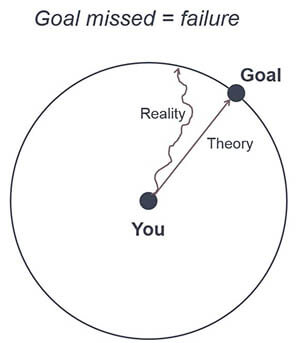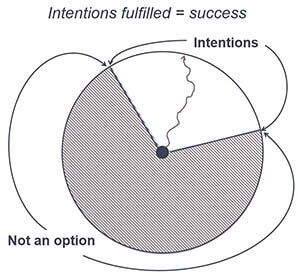For career success, take a long-term perspective, "WU Executive Academy"
Vienna, Austria – Dr. Conrad Pramböck, Head of Compensation Consulting at Pedersen & Partners, explains why it is better to define intentions than set goals for a personal career path.

We live in a society that constantly harangues us about setting and reaching goals. Specific goals may be useful in the short term, but they are complete nonsense as far as long-term endeavours are concerned – such as a successful career.
For many people, nothing is more frustrating than a dream come true. After all, goals mark temporary endpoints. Once you reach a goal, you will make new plans and set yourself new goals, and if you keep going on like this, you will soon end up in the straitjacket of ambition.
What can we pursue as an alternative to setting goals? Defining intentions.
While goals are narrow and short-term in nature, intentions have a long-term effect and broaden our horizons. If you want to achieve career success, you must adopt a long-term perspective. The future is impossible to predict; the world has become so complex that we cannot look more than approximately six months ahead with any degree of certainty. Planning a business trip a year in advance is borderline negligence.
Life is completely unpredictable, and hindsight is always twenty-twenty. We meet new people; the economic landscape changes fundamentally; cruel twists of fate challenge us; job-related requirements and duties keep evolving; the competition launches new products, our private lives turn upside down overnight.
In today's fast-moving world, you simply cannot plan your career as a series of short-term goals that serve as the yardstick by which you measure your progress. Great careers need broader perspectives – they need intentions.
Goals and intentions
Imagine that you are standing in the middle of a circle, surrounded by 360 degrees of possibility. Your goal is one single point on the edge of the circle. No matter how much planning and focus you put in, it will be virtually impossible for you to reach that precise point.

Setting yourself concrete, long-term goals usually leads to disappointment because you have specific expectations as a result of your goals. However, there is a difference between theory and reality, and expectations narrow the mind. You rarely get exactly what you expect from life, and this may make you seem ungrateful.
For instance, if you expect your partner to invite you out to dinner on your birthday, but they take you to a concert instead, you may be disappointed and express this with resentment. However, if your intention is to have a good time with your partner on your birthday, there are many ways in which these expectations can be met, and the evening will be more enjoyable for both of you. Perhaps your partner has a great idea, which will exceed all your expectations.
Your intentions are not a single point on the edge of a circle. They are more like a slice of a pie chart; representing all the things you consider desirable and reasonable, with anything outside the slice not an option for you. Life will bring you many opportunities that you would never even have dreamt of – perhaps your boss entrusts you with new tasks, or a head-hunter offers you an interesting job. Your intentions will help you make the right decisions, allowing you to keep your life on track. They provide the basis for deciding what offers to decline straight away, and what offers to consider.
How to define your intentions
In order to define your intentions, you first need to cast your mind back to the most enjoyable and the most horrible events in your life. Then, complete the following sentence: "Because of this experience, my intention from now on, for the rest of my life, will be …"
For example: When I was about twenty years old, I performed a Liszt rhapsody in concert. As I played the final chord, I felt that this had been my best performance of this piece ever. I got up to take a bow and was both surprised and overwhelmed to receive a standing ovation. Because of this experience, I have made it my intention to perform onstage as often as possible, to do my best and ultimately enjoy the audience's applause. Today, I get that same wonderful feeling when giving speeches and lectures.
Another example, these time a negative one: Some years ago, I lost my job when my former employer filed for bankruptcy. I was only out of work for nine weeks, but it was a horrible experience. I was a young father, and I did not know how I was going to feed my little family. But because my professional network offered me great support in finding a new job, ever since then I have made it my intention to do even more to foster relationships of trust with all of my business contacts.
A final example: I once pondered the question of how much money I would need in my bank account in order to be able to live my life without anxiety. At some point, I realized that there was no amount of money in the entire world that could possibly give me complete peace of mind. When I came to understand that these feelings had nothing to do with money, I resolved that in my career, I would only do things that I am good at and enjoy doing. The anxiety and doubt disappeared and never returned.
Good intentions alone are not enough
Defining your intentions is an important first step. However, it takes strength of character to lead a successful, fulfilling and happy life within the context of your intentions. Above all, you must be courageous, determined and resolute.
You must be courageous because others – initially your parents, later your colleagues and perhaps your partner – will always question whether you are making the right choice. These people mean well, but their concerns may make you feel uncertain. Hence, in order to fulfil your intentions, you will need the courage to defend your decisions and visions.
You must be determined in order to carry on. All of the great people we look up to – from an entrepreneur working on entering overseas markets to a writer who has just published his first book – know this only too well. If you want to be really successful, you must make sacrifices. These sacrifices are often made quietly and privately, and hence go largely unnoticed by outsiders. Your determination will keep you going when the going gets tough.
You must be firm and say no to anything that is not in keeping with your intentions. If you intend to surround yourself solely with cultured and intelligent individuals, you must get rid of all the idiots in your life. You must be prepared to be uncompromising. Now that I know the indescribable joys of fatherhood, I have made it my intention never to accept a job offer that would require me to permanently relocate to a faraway country – no matter how tempting the pay check may be.
Follow your intentions

By making yourself aware of your intentions, you set the scene for a successful and fulfilling life. Whatever you achieve within this context is a success, irrespective of whether or not it corresponds to a specific goal. If your intention is to lead a wealthy and affluent life, it does not matter whether you earn, marry or win the money to do so.
Life holds a wide variety of opportunities in store for you. Some may result from your actions, while others simply come your way. Your intentions help you separate the wheat from the chaff, allowing you to live your life exactly the way you want it to be.
 Conrad Pramböck is the Head of Compensation Consulting at Pedersen & Partners. Based in Vienna, Austria, he is responsible for consulting companies on all aspects of compensation, including providing companies with up-to-date market information on salary ranges and design of bonus systems across all industries and geographies. Prior to joining the firm, Mr. Pramböck held several senior positions in international consultancy firms. He started his career with a German Consultancy firm working in management consulting and later in the Compensation Consulting business unit based in Austria. For the following seven years he worked with one of the top Austrian Executive Search firms as the Head of Compensation Consulting. He was responsible for all international compensation consulting activities and developed and maintained an international compensation database in 40 countries.
Conrad Pramböck is the Head of Compensation Consulting at Pedersen & Partners. Based in Vienna, Austria, he is responsible for consulting companies on all aspects of compensation, including providing companies with up-to-date market information on salary ranges and design of bonus systems across all industries and geographies. Prior to joining the firm, Mr. Pramböck held several senior positions in international consultancy firms. He started his career with a German Consultancy firm working in management consulting and later in the Compensation Consulting business unit based in Austria. For the following seven years he worked with one of the top Austrian Executive Search firms as the Head of Compensation Consulting. He was responsible for all international compensation consulting activities and developed and maintained an international compensation database in 40 countries.
Pedersen & Partners is a leading international Executive Search firm. We operate 55 wholly owned offices in 51 countries across Europe, the Middle East, Africa, Asia & the Americas. Our values Trust, Relationship and Professionalism apply to our interaction with clients as well as executives. More information about Pedersen & Partners is available at www.pedersenandpartners.com
If you would like to conduct an interview with a representative of Pedersen & Partners, or have other media-related requests, please contact: Diana Danu, Marketing and Communications Manager at: diana.danu@pedersenandpartners.com
